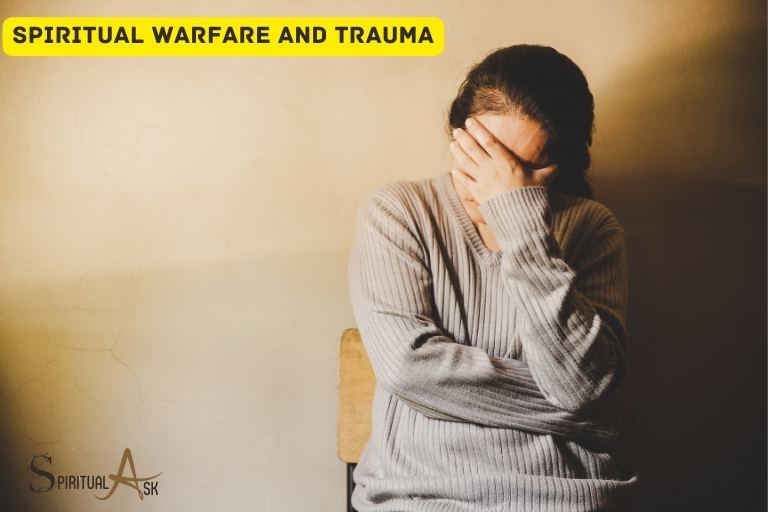Spiritual Warfare And Trauma: Good And Evil Forces!
Spiritual warfare and trauma refer to the battle between good and evil forces, specifically the struggle individuals face in overcoming emotional and psychological wounds inflicted by negative spiritual influences.
Spiritual warfare involves a person’s struggle against evil forces such as demonic oppression, temptation, and negative thoughts.
Trauma, on the other hand, is a deeply distressing or disturbing emotional and psychological experience that can be caused by various factors, including spiritual warfare.
The connection between spiritual warfare and trauma lies in the fact that both can significantly impact an individual’s mental, emotional, and spiritual well-being, leading to a weakened state and vulnerability to further negative influences.
Spiritual warfare and trauma can be deeply intertwined, as both can result in lasting damage to a person’s emotional and psychological state.
It is crucial to recognize the signs of spiritual warfare and address the root causes of trauma in order to effectively combat these negative influences.
By nurturing one’s spirituality, seeking professional help, and practicing self-care, individuals can reclaim their power and begin the healing process, ultimately overcoming the challenges posed by spiritual warfare and trauma.

Key Takeaway
Chart about Spiritual Warfare and Trauma
| Topic | Description | Examples | Techniques for Healing & Support |
|---|---|---|---|
| Spiritual Warfare | The struggle or conflict between good and evil, usually involving faith or religious beliefs. | Demonic oppression, temptation, spiritual attacks, witchcraft | Prayer, fasting, scripture study |
| Psychological Trauma | Emotional and psychological response to an extremely distressing event or series of events. | War, natural disasters, abuse, accidents | Therapy, support groups, journaling |
| Spiritual Trauma | Damage to one’s spiritual well-being due to a violation of trust, betrayal, or an experience of spiritual abuse. | Manipulation by religious leaders, cults, spiritual abuse | Spiritual counseling, forgiveness |
| Emotional Trauma | A long-lasting and deep emotional response to a distressing event that affects one’s emotional well-being. | Loss of a loved one, relationship breakdown, bullying | Emotional support, self-care |
| Physical Trauma | Bodily injury or damage caused by an external force or event. | Car accidents, sports injuries, physical abuse, surgery | Medical treatment, physical therapy |
| Complex Trauma | The experience of multiple traumas or ongoing trauma, often from an early age. | Childhood abuse, neglect, living in a war zone | Trauma-informed therapy, PTSD treatments |
Five Facts About Spiritual Warfare and Trauma
Defining Spiritual Warfare

Spiritual Warfare And Trauma
Trauma can take a significant toll on one’s mental, emotional, and spiritual health.
Even though one may seek help from a qualified therapist or medical practitioner, spiritual warfare can still be felt.
The battle for the soul is real, and understanding the nature of spiritual warfare is vital in the journey of trauma healing.
Theological Explanation
Spiritual warfare is the ongoing battle between good and evil. It is a battle for the soul that every human being fights daily, whether consciously or unconsciously.
According to ephesians 6:12, we wrestle not against flesh and blood, but against principalities, against powers, against the rulers of the darkness of this world, against spiritual wickedness in high places.
While this is a spiritual battle, it has very real-world consequences, including traumatic experiences.
Practical Perspective
Traumatic experiences can have a profound impact on one’s spiritual life. An individual may feel disconnected from their faith or divine connection, resulting in a sense of hopelessness and despair.

The impact of trauma can make one susceptible to negative spiritual influences and behaviors, leading to addiction or other harmful actions.
It is crucial to understand the role of spiritual warfare in traumatic experiences and actively work towards healing and restoration. Such struggles often have both emotional and spiritual dimensions, requiring a holistic approach to address the deeper issues at play. For example, challenges like alcoholism and spiritual warfare can intertwine, as individuals may find themselves battling destructive habits while facing internal or external forces that hinder their recovery. By seeking both divine guidance and practical support, healing and restoration become attainable, even in the darkest of circumstances.
The Role Of Faith/Religion
Faith and religion play a significant role in spiritual warfare. A strong faith or belief in a higher power can provide a source of comfort and strength during challenging times.
It is essential to find a supportive community that shares the same faith and can provide a safe space for one to heal and grow.
Incorporating spiritual practices such as prayer and worship can also aid in the journey of healing and restoration.
Understanding spiritual warfare is critical in the journey of trauma healing. It is a battle that goes beyond the physical realm, affecting the mental, emotional, and spiritual health of individuals.
By recognizing the role of faith and seeking help from a qualified professional, one can work towards restoration and find peace in the midst of the battle.
Understanding Trauma

Spiritual Warfare And Trauma
Trauma is a deeply distressing or disturbing experience that can have severe effects on a person’s mental, physical, or emotional well-being. Understanding trauma is essential to recognizing and addressing its impact on individuals.
Definition And Types
- Trauma can be classified into three major categories: Acute, chronic, and complex trauma.
- Acute trauma is caused by a single event or exposure to a highly stressful situation, while chronic trauma occurs over a prolonged period, and complex trauma typically involves multiple events and is often experienced during childhood.
Physical, Emotional, And Psychological Impacts

Trauma can have a significant impact on all aspects of a person’s life, including physical, emotional, and psychological well-being.
- Physical symptoms of trauma can include headaches, fatigue, changes in appetite or sleep patterns, and chronic pain.
- Emotional symptoms may include anxiety, depression, difficulty concentrating, or feeling detached from oneself or others.
- Psychological impacts may include the development of post-traumatic stress disorder (ptsd), phobias, or dissociative disorders.
The “Hidden” Trauma Of Spiritual Warfare
Spiritual warfare can also cause hidden trauma that impacts a person’s spiritual and emotional well-being, but may not be outwardly visible.
- The trauma experienced through spiritual warfare may be hidden or denied due to a lack of understanding or stigma attached to discussing experiences related to spiritual warfare.
- This type of trauma can manifest in different ways, such as spiritual oppression, dark thoughts, delusions, or paranormal events.
- Identifying and treating spiritual trauma requires special attention from healthcare professionals who recognize and understand the implications of spiritual warfare on individuals’ health.
Understanding trauma is critical in recognizing and addressing the impact it can have on individuals. Spiritual warfare can also cause hidden trauma, which necessitates healthcare professionals’ acknowledgment and understanding of the implications of such experiences on individuals’ mental and spiritual health.
The Impact Of Spiritual Warfare On Trauma

Spiritual Warfare And Trauma
Trauma can impact one’s emotional, mental, and physical well-being, leading to spiritual struggles.
In this section, we’ll explore the impact of spiritual warfare on trauma and how it affects faith and spirituality. We’ll also discuss spiritual resources for healing.
Spiritual Implications Of Trauma
Trauma can have significant spiritual implications. It can challenge one’s belief in god and make it difficult to trust in his plan. Some individuals may even blame god for their suffering and feel abandoned by him.
Other spiritual implications of trauma may include:
- A loss of purpose or meaning in life
- A feeling of disconnection from others and from god
- Difficulty in praying or communicating with god
- A sense of shame or guilt
How Trauma Affects Faith And Spirituality
Trauma can affect faith and spirituality in various ways.

Here are some of the ways trauma can impact one’s faith:
- It may cause individuals to question their beliefs in god or religion.
- Trauma may also lead to feelings of anger or resentment towards god.
- It can cause individuals to feel disconnected from their community or religious leaders.
- The pain and suffering caused by the trauma may create difficulty in feeling god’s presence, leading to feelings of abandonment.
Spiritual Resources For Healing
When individuals struggle with spiritual issues caused by trauma, it’s essential to seek spiritual resources for healing.
Here are some resources to reach out to:
- Support groups at religious institutions
- Pastoral counseling or spiritual direction
- Reading religious texts or books on spirituality and trauma
- Mindfulness meditation and other spiritual practices
- Prayer or participation in religious services
Overcoming the spiritual implications of trauma can be a challenging journey. Still, with the help of spiritual resources, individuals can find healing and continue moving forward in their spiritual lives.
The Role Of Spiritual Warfare In Trauma
Trauma can happen to anyone at any time, and it has the potential to affect our mental, physical, and spiritual well-being.

Often, when we experience trauma, we may feel like our life has been stripped away from us. It can cause us to question the very core of who we are, leading to a sense of spiritual emptiness and loss of faith.
This is where spiritual warfare plays a role in trauma.
The Relationship Between Trauma And Spiritual Warfare
Trauma and spiritual warfare are intimately connected. Spiritual warfare is a battle over the mind, body, and soul.
Trauma triggers our deepest fears, doubts, and insecurities, and this can cause us to question our faith and spiritual beliefs.
The impact of spiritual warfare on trauma can lead to a range of different issues, including:
- Hurting our relationship with god and feeling abandoned by him
- Difficulty trusting others and feeling disconnected from those closest to us
- Struggling with feelings of shame, guilt, and unworthiness
- Physically harming ourselves or turning to unhealthy coping mechanisms like substance abuse.
The Impact Of Spiritual Warfare On Mental Health
The impact of trauma on mental health is well documented.

But what people often fail to realize is how spiritual warfare can further compound the effects of trauma, making the healing process even more complicated.
Here are some of the ways that spiritual warfare can impact our mental health:
- Heightened levels of anxiety and depression
- Difficulty managing emotions and gauging appropriate responses to situations
- Fear of intimacy and vulnerability with others
- Struggling with feelings of hopelessness and suicidal ideation.
Coping With Spiritual Warfare-Related Trauma
Trauma shakes us to our core. It’s a life-altering experience that can lead to long-lasting effects on our mental, physical, and spiritual well-being. But it’s important to realize that there is hope and healing from spiritual warfare-related trauma.
Here are a few tips on coping with this type of trauma:
- Seek professional help in the form of therapy or counseling
- Practice self-care rituals such as meditation, exercise, or journaling
- Build a support system of friends and family who will stand with you in times of struggle
- Reconnect with your faith and seek spiritual guidance and comfort.
Spiritual warfare plays a significant role in trauma, and it’s crucial to address it as a significant part of the healing process.
By understanding the relationship between trauma and spiritual warfare, recognizing the impact of spiritual warfare on mental health, and implementing effective ways of coping with spiritual warfare-related trauma, we can find healing and wholeness.
Conventional And Alternative Healing Methods
Spiritual warfare and trauma are two complex concepts that require a holistic approach to finding healing.
Many conventional and alternative healing methods aim to alleviate the effects of trauma in the lives of individuals.

Psychotherapy
Psychotherapy is one of the most frequently used methods for treating trauma. This method employs talk therapy and cognitive-behavioral techniques to help people learn to manage their traumatic experiences.
Key points about psychotherapy include:
- It is goal-oriented and aims to facilitate healing.
- Trauma-focused therapy is a specialized type of psychotherapy for trauma survivors.
- It requires the expertise of a licensed and trained professional.
Medication
Medication is another conventional method used to treat trauma. Prescription medication can help individuals manage symptoms such as depression, anxiety, and insomnia.
Key points about medication use include:
- Medication can be used alongside other treatment methods.
- It is essential to only take medication as prescribed by a licensed professional.
- The medication cannot cure trauma but helps in managing the symptoms.
Complementary And Alternative Approaches

In addition to conventional methods, alternative approaches can be used to aid individuals in their healing process. Complementary and alternative approaches include meditation, mindfulness, and prayer.
Key points about these approaches include:
- These methods help individuals reconnect with their inner selves and gain a sense of peace.
- They can enhance other treatment methods, such as psychotherapy and medication.
- One does not need to be religious to benefit from these approaches, and they can be tailored to an individual’s specific beliefs.
The use of complementary and alternative methods can be a highly effective way to heal from trauma and spiritual warfare.
By incorporating these various approaches into a treatment plan, a more holistic and effective approach to healing can be achieved.
Remember to always consult with a licensed professional and tailor your healing journey to your specific needs and beliefs.
The Role Of Faith Communities
Trauma can be a debilitating experience that impacts individuals physically, emotionally, and mentally. Yet, it is not a burden that must be endured alone, as faith communities play a crucial role in healing and recovery.

Here are some of the ways that faith communities can provide support in times of trauma:
The Importance Of Spiritual Support
Faith communities provide a strong foundation of spiritual support, which is vital in times of trauma. This could include prayers, meditation, and other forms of spiritual rituals that can lift the spirits of those who are struggling.
Additionally, connecting with a community of believers who share similar beliefs can offer a sense of belonging and purpose, which can be incredibly empowering.
- Spiritual support is important in times of trauma.
- Faith communities offer prayers, meditation, and other spiritual rituals.
- Connecting with a community provides a sense of belonging and purpose.
Pastoral Care And Counseling
Faith communities also offer pastoral care and counseling. Spiritual leaders, such as pastors or priests, are trained to provide guidance, support, and comfort in times of need.

They are often well equipped to help individuals navigate through the complexities of their trauma and offer words of wisdom or acts of kindness that can provide hope in the darkest of times.
- Faith communities offer pastoral care and counseling.
- Spiritual leaders are trained to provide guidance, support, and comfort.
- They can help individuals navigate through the complexities of their trauma.
Community Resources
Faith communities also provide access to resources that can assist in the healing process. For example, they may offer support groups, counseling services, and referral services to mental health professionals who specialize in trauma.
These resources can be incredibly valuable in helping individuals manage their symptoms and work through their trauma.
- Faith communities provide access to resources that assist in the healing process.
- They may offer support groups, counseling services, and referrals to mental health professionals.
- These resources can help individuals manage their symptoms and work through their trauma.
Faith communities play a critical role in providing spiritual and emotional support to those who are suffering from trauma.
They offer a sense of belonging, pastoral care and counseling, and community resources that can assist in the healing process.
For those in need, reaching out to their faith community can be the first step in their journey towards healing and recovery.
Developing Resilience

Spiritual Warfare And Trauma: Developing Resilience
Spiritual warfare and trauma are two of the most challenging experiences that a person can face. While both can be incredibly difficult to overcome, developing resilience is one way to regain control and move forward in a positive direction.
Here are some key points to consider when building resilience, finding coping strategies and practicing spiritual habits:
Building Resilience Factors
Resilience is the ability to recover and bounce back from challenging experiences.
Several factors can have a positive impact on resilience, including:
- Positivity: Maintaining a positive attitude and outlook can help you deal with and overcome adversity.
- Connections: Strong relationships with friends, family, and a support network can help you cope and build resilience.
- Problem-solving skills: The ability to analyze problems and come up with solutions can help you overcome adversity more effectively.
- Coping strategies: Knowing how to manage stress and anxiety can help you build resilience and approach challenges with a clear mind.
Coping Strategies For Spiritual Warfare And Trauma
Coping strategies are specific techniques you can use to help manage stress, anxiety, fear, and other negative emotions associated with spiritual warfare and trauma.
Some effective coping strategies include:
- Deep breathing exercises: Practicing slow, controlled breathing can help calm your mind and reduce stress and anxiety.
- Physical activity: Regular exercise can help release pent-up emotions and stress, improving overall mental and emotional health.
- Relaxation techniques: Techniques such as meditation, yoga, and massage can help you relax and reduce tension and stress levels.
- Positive self-talk: Encouraging and positive self-talk can help you manage negative emotions and boost your self-confidence.
- Seeking professional help: Consulting a mental health professional can provide you with strategies and tools to help manage trauma and overcome spiritual warfare.
Spiritual Practices For Resilience
Spiritual practices can help you build resilience by providing you with tools and resources to cope with challenging experiences.
Here are some spiritual practices that can help you build resilience:
- Prayer and meditation: Connecting with a higher power can provide you with a source of strength and comfort during difficult times.
- Gratitude journaling: Keeping a record of things you’re grateful for can help shift your focus towards positivity and resilience.
- Forgiveness and empathy: Practicing forgiveness and empathy can help you build stronger relationships with others and help you cultivate a more positive outlook on life.
- Acts of kindness: Reaching out to others and performing acts of kindness can help you connect with your community and restore a sense of purpose and meaning in your life.
Developing resilience is an effective way to overcome spiritual warfare and trauma.
By building resilience factors, finding coping strategies, and practicing spiritual habits, you can regain control, find support, and move forward towards a more positive future.
How Can Spiritual Warfare Affect Mental Health, Including Trauma and Schizophrenia?
Schizophrenia and Spiritual Warfare can intertwine in complex ways, impacting mental health significantly.
While spiritual warfare often deals with the metaphysical battle between good and evil forces, its perception can deeply affect individuals, especially those with mental health conditions like schizophrenia or trauma.
- Heightened Anxiety or Fear: Concerns about spiritual warfare can exacerbate anxiety, leading to increased stress and fear.
- Influence on Perception: Individuals with schizophrenia may interpret their experiences through the lens of spiritual warfare, affecting their grasp on reality.
- Trauma Responses: Those with trauma might perceive their spiritual struggles as a replay of past events, hindering healing and progress.
It’s crucial to approach the intersection of spirituality and mental health with sensitivity and understanding, recognizing that spiritual beliefs can profoundly affect one’s mental well-being and perception of reality.
FAQ About Spiritual Warfare And Trauma
What Is Spiritual Warfare Linked With Trauma?
Spiritual warfare is linked with trauma because both affect the spiritual and emotional realms.
How Does Spiritual Warfare Affect Trauma Survivors?
Spiritual warfare affects trauma survivors by attacking their beliefs, making them doubt their faith and protection.
What Are Some Prayer-Based Strategies To Fight Spiritual Attacks On Trauma Survivors?
Pray for spiritual protection, remove negative influences, meditate on positive affirmations, and deliverance prayers.
Can Counseling Help Trauma Survivors Battling Spiritual Warfare?
Yes, counseling can help trauma survivors battling spiritual warfare. Counseling can help people process their trauma, providing healing.
Conclusion
Ultimately, spiritual warfare and trauma are deeply intertwined, with one often feeding into the other.
While it can be a difficult and painful journey, individuals who have experienced trauma can find solace in a relationship with a higher power.
Spiritual practices such as prayer and meditation can help individuals feel more connected to the divine and provide a source of strength and courage to face their challenges.
Seeking the assistance of a professional therapist or counselor can also be a valuable tool for managing the effects of trauma.
As we continue to navigate the ever-changing landscape of mental health and spiritual wellness, it is important to understand the complex intersection between trauma and spiritual warfare and work towards finding healthy solutions that can support individuals on their healing journey.
By acknowledging the impact of spiritual warfare and trauma, we can take active steps towards regaining a sense of wholeness, balance, and inner peace.






